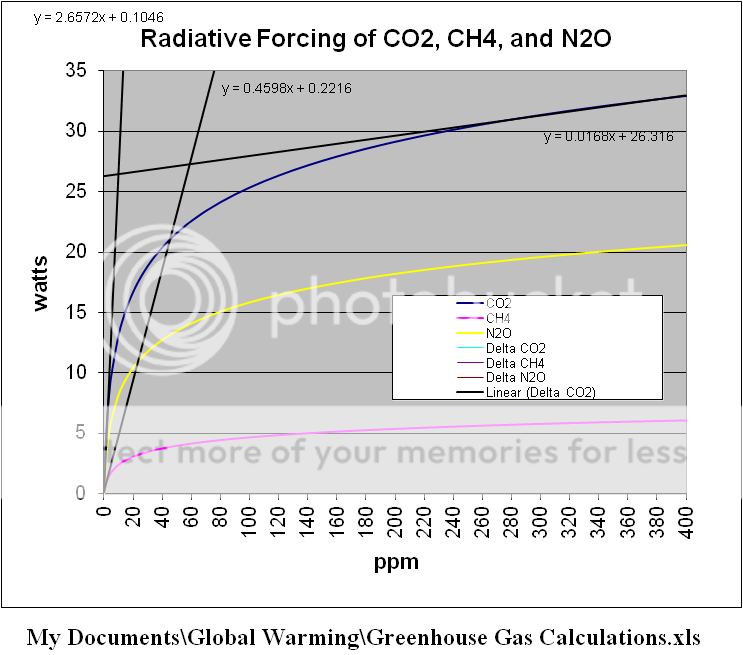My simple question
I'd like to know for a given increase in the amount of methane in
the atmosphere, how much that would that run-up the temperature
and how long will it take?
Got a complicated answer:
1 ton of added CO2 calculates to no change in warming until you use
eleven significant digits. 1 ton of added CH4 can be seen if you
calculate ten significant digits. That's how that works. At the slop
of the equation. However, realistic changes don't follow this path.
CO2 is actually more than five more potent of a greenhouse gas than CH4.
It's all how you calculate the numbers, and the alarmists use a method
to alarm.
Please note the slopes where the levels are at. The slope of CO2
is 0.068 and the slope of CH4 is 0.4598, by the levels and formulas
used to calculate forcing. This is how RE is calculated. The slope
is from two points on the curve, 1 ppb apart. GWP uses an added ton
instead of an added ppb. the slopes will be insignificant different,
and since CO2 is 2.75 times heavier than CH4, it's like adding
2.75 pb vs. 1 ppb for CO2. This is where the GWP numbers around 75 to
80 come from. Now... during the same time frame we added about
200 gigatons of CO2, we added less than 1 gigaton of CH4.
No matter how you slice it, CH4 is not as scary as portrayed.
That's right,
CH4 is not as scary as portrayed. But watts per
square meter doesn't mean anything to most people including me.
I'm not picking on you, I always run into the watts per square
meter lingo when I start looking for this answer. But it's an
answer that will mean something. After all Climate Change is all
about temperature. Just look at all the arguments over hottest
year ever etc. Temperature is what people want to know.
So your answer didn't tell me what the temperature would be for a
given increase in methane. Didn't say how long it would take either.
But you did show your work (-:
I should have asked, if you double methane how much and how long?
The how long part is easy. This web page
https://www.esrl.noaa.gov/gmd/ccgg/trends_ch4/#global_growth
tells us that CH4 is in the air at about 1850 ppb and is
increasing at an average rate of about 6 ppb which works
out to around 300 years to double its concentration.
The temperature part should be easy because just like CO2
the climate sensitivity for CH4 should be well known. But
it's not. I'm talking the absolute value without feed backs.
For CO2 it's 1.2 K per doubling. I'm pretty sure the value
for doubling methane is somewhere between 0.1 and 0.3 K.
I've gotten to those answers by asking and some crude
arithmetic. The crude arithmetic got me to 0.18 K.
Here's the crude arithmetic:
Methane's concentration is about 2 ppm and an equal mass
of CO2 is about 0.7 ppm. Adding 2 ppm to the concentration
of methane is a 100% increase, and adding 0.7 ppm to CO2
is a 0.2% increase.
It doesn’t take a genius to figure out that a 0.2% increase
in CO2 won't run the temperature up very much and 84 times
that isn't very much either.
0.7 ppm/400 ppm x 1.2 K x 84 = 0.18 K
So in general terms, how much will a given rise in methane
run up the temperature? The answer is not much and it will
take a long time.
If you read all this, thanks.


